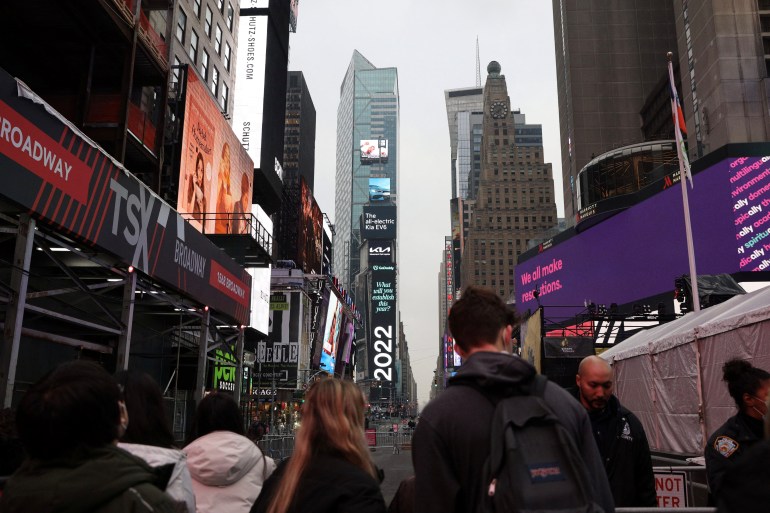New Year's celebrations around the world were canceled or reduced, after record infections with the Corona virus cast a shadow over the atmosphere of the celebration for the second year in a row, as the world separates a few hours from the start of a new year, in light of many countries in the world imposing strict restrictions to limit the new epidemic wave.
The new year has already begun in New Zealand in the far eastern part of the globe in a calm atmosphere without the official display of fireworks in Auckland, while Australia pledged to start global celebrations by setting up a dazzling fireworks display that reflects its lights on Sydney Harbor - the largest city in Australia - which overlooks it The famous Sydney Opera House.
And unlike last year's event without an audience, tens of thousands attended the Sydney parade.
And there will be no show on the occasion of the end of this year at many famous landmarks in the world, as Paris canceled the annual parade over the Arc de Triomphe, while London canceled the fireworks display over Big Ben, and Malaysia canceled it over the Petronas Towers in Kuala Lumpur.
New York's famous Times Square will host a celebration of the coming of the New Year, but in smaller numbers (Reuters)
Times Square
It is expected that the Golden Ball will land in the famous Times Square in New York, but the crowds that usually gather there to celebrate the advent of the New Year will be reduced to a quarter, taking into account the placement of masks, the application of social distancing rules and the presentation of a certificate proving receipt of the anti-Covid-19 vaccine.
Yesterday, Thursday, the US health authorities recommended avoiding cruise ships, explaining that "the risk of infection with Covid-19 on board is very high", even for vaccinated people.
The authorities in South Korea canceled the traditional midnight bell-ringing ceremonies for the second year, and announced the extension of strict social distancing measures for two weeks to counter a continuing increase in infections.
In China, where the Corona virus first appeared at the end of 2019, a state of high alert prevailed, as the city of Xi’an imposed closure measures, and other cities canceled New Year celebrations, including the annual light show along the Huangpu River in downtown Shanghai, which usually attracts hundreds of thousands of people. onlookers.
In Thailand, authorities have allowed New Year's Eve parties and fireworks displays to continue, albeit with strict security measures, and will broadcast New Year's Eve prayers online.
Indonesian police have taken security measures to prevent crowds in the streets of Jakarta on the occasion of the New Year celebrations (Reuters)
As for Indonesia, the police said they would close 11 streets that are usually crowded with revelers on New Year's Eve in the capital, Jakarta, and Malaysia banned large gatherings across the country and canceled a fireworks display in Kuala Lumpur.
Japan and India
Japanese Prime Minister Fumio Kishida - through his official YouTube channel - urged residents to wear masks at parties, reduce attendance, and prevent the famous Shibuya entertainment district in Tokyo from end-of-year parties.
Indians celebrate the end of the year in a street in Ahmedabad (Reuters)
The Indian authorities began tightening restrictions yesterday, Thursday, to prevent large gatherings on the occasion of the end of the year celebrations, as they imposed a night curfew in all major cities, and ordered restaurants to reduce the number of customers.
In Canada, the eastern province of Quebec announced a night curfew again from ten in the evening until five in the morning, after the province recorded a record number of injuries due to the rapid spread of the Omicron mutant in Canada.
Several provinces in Canada recently imposed stricter restrictions on gatherings, and delayed the return of students to school after the Christmas holidays.
But South Africa - in which the first cases of the Omicron mutant were detected at the end of next November - announced one of the good surprises this year, saying that the wave of the mutant subsided without causing a huge increase in deaths, and the authorities suddenly lifted the night curfew, allowing Celebrating the new year.
Despite the current epidemic wave, the celebrations of Rio de Janeiro in Brazil have been maintained, usually gathering 3 million people on Copacabana Beach.
European countries
In Europe, the continent most affected by the new wave, the French authorities closed nightclubs today and over the coming weeks, and the Paris authorities imposed a muzzle on the street.
In Greece, bars and restaurants will close at midnight, but they will be allowed to open their doors on the night of December 31 this year until two in the morning.
Some residents of the Dutch city of Verden celebrate the end of 2021 (European)
In Spain, celebrations were canceled in most regions.
And 9 of the ten most populous cities in the country will not hold the “campanadas” celebration, which is the ringing of bells at the beginning of the New Year, and only Madrid has maintained the celebration within a minimum ceremony in the famous Puerta del Sol, with a limited attendance of 7,000 people, and with the status of The muzzle, compared to 18,000 in 2019, that is, before the outbreak of the pandemic.
In Germany, nightclubs will remain closed on New Year's Eve, and Health Minister Karl Lauterbach has warned that the new restrictions that entered into force last Tuesday "will not be enough" in the face of Omicron, which is expected to cause a "sharp rise" in the number of infections in the coming weeks.

